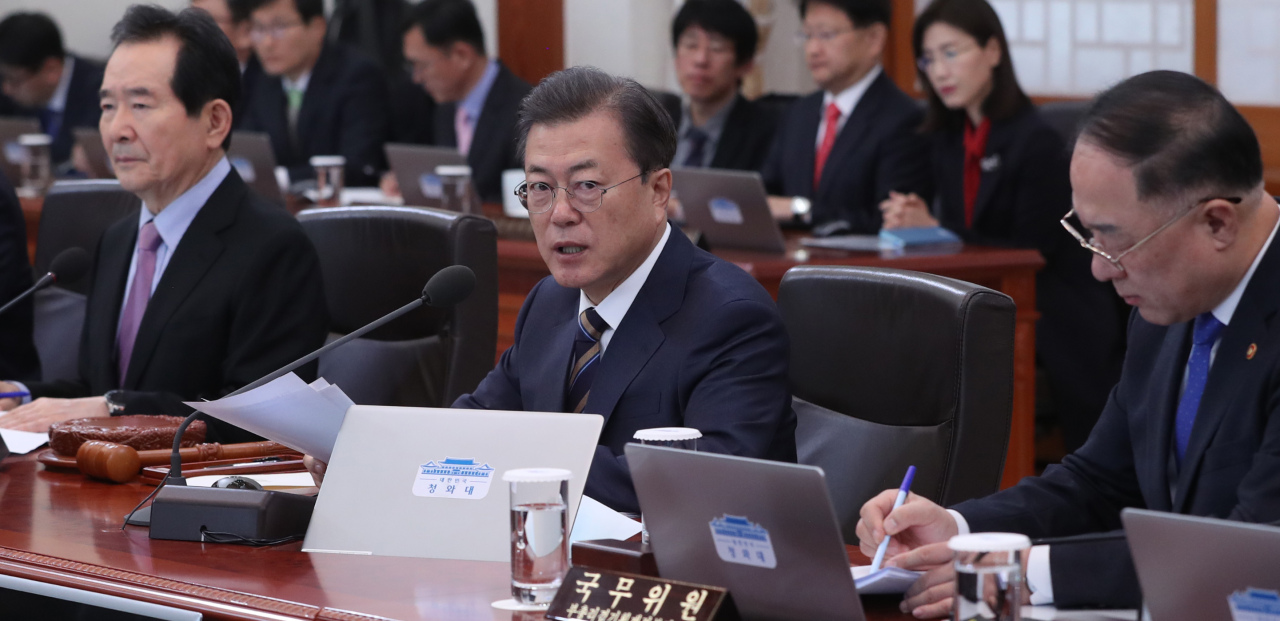President Moon Jae-in on Tuesday again called on the government to do all it can to deal with the economic fallout of the coronavirus outbreak.
Speaking at a Cabinet meeting, Moon said the outbreak has created an “emergency economic situation” that calls for extraordinary measures, and stressed the need to cooperate with neighboring countries.
“Extraordinary situations need extraordinary measures. Preemptive response and special measures for both the people’s safety and the economy should be drawn up,” Moon said, calling for measures to minimize the economic impact of the outbreak for the second consecutive day.
Later in the day, Cheong Wa Dae revealed that the first package of measures would be announced before the end of the month.
“President Moon said that timing is critical in policies, that urgent measures are needed. The government will move with the aim of rolling out policies as soon as possible,” Cheong Wa Dae spokesperson Kang Min-seok said.
Kang did not reveal details of the measures, saying only that “various incentives” for small merchants and landlords would be considered and that “bold measures” for corporations were discussed.
Moon went on to say that the government is handling the situation within the country, though the situation in China and Japan remains serious. He also called for international cooperation.
“To become safe from a contagious disease that crosses borders, it is important for neighboring countries to be stabilized as soon as possible,” Moon said, urging government officials to focus on international cooperation and aid.
Although the number of new diagnoses made each day in China has fallen below 2,000, fatalities and the number of confirmed cases continue to grow. With more than 400 cases, Japan has the largest number of confirmed cases outside China.
The president went on to stress the importance of China for Korea’s economy.
“If China’s economic situation deteriorates, we receive the biggest impact. The production activities and supply chains of our companies linked to China are being affected, and exports to China are falling by big margins,” Moon said.
China is Korea’s largest export destination, accounting for about a quarter of outbound shipments. China is also a major supplier of parts to local industries, and operations of local carmakers have already been affected by shortage of parts from China.
“Concerns are rising that (the coronavirus outbreak) will bring a much larger and longer shock than SARS and MERS. The situation calls for special measures that utilize all means the government can employ.”
Saying the economic situation is more serious than expected, Moon called on the government to review measures such as financial aid and tax reductions to SMEs and small merchants.
Moon also urged government officials to diversify import and export routes and to nurture local industries, again drawing a comparison with Japan’s trade curbs and Korea’s response.
“Crisis should be used as driving force of innovation to create the opportunity to move toward an unshakable economy. As the lesson from Japan’s unfair export restrictions showed, our economy’s excessive external dependence can pose a threat to the economy at any time,” Moon said.
He said the government should focus on entering new markets and diversifying import sources, and offer wider opportunities for Korean companies operating overseas to relocate facilities to Korea.
As the number of confirmed cases in Korea continued to rise, with the transmission route unclear in the three latest cases, Moon again urged the public to have faith in the government, warning that “excessive fear” is damaging to the economy.
By Choi He-suk (
cheesuk@heraldcorp.com)








![[Today’s K-pop] Blackpink’s Jennie, Lisa invited to Coachella as solo acts](http://res.heraldm.com/phpwas/restmb_idxmake.php?idx=644&simg=/content/image/2024/11/21/20241121050099_0.jpg)